人教版英语八下Unit9Haveyoueverbeentoamuseum教案
人教版八年级下英语教案Unit 9 Have you ever been to a museum 教案

Unit 9Have you ever been to a museum?Language Goals【语言目标】Learn to talk about past experiences.Knowledge Goals【知识目标】Key Words:somewhere,camera,invention,invent,unbelievable,progress,rapid,unusual,toilet,social,peaceful,perf ect,itself,collect,German,province,safe,simply,fear,whether,Indian,Japanese,fox,whenever,spring Key Phrases:encourage sb.to do sth.,on the one hand…on the other hand,thousands ofKey Sentences:1.—Have you ever been to a science museum?—Yes,I have.I went to the National Science Museum last year.2.—I have never been camping.—Me neither.3.It also encourages governments and social groups to think about ways to improve toilets in the future.4.—I have been to the art museum many times.—Me too.And I have also visited the nature museum.5.Have you visited the Palace Museum?6.Have you been to the Great Wall?7.You won’t have any problem getting rice,noodles or dumplings.Key Grammar:Learn “has/ have been to someplace”.Ability Goals【能力目标】1.Be able to talk about past experiences.2.Enable students to write an article to advertise your hometown.Moral Goals【情感目标】1.Let the students know they should love their hometown.2.Let the students know they should do something for their hometown.Teaching Time【课时】Five periodsPeriod 1Section A(1a-2d)Period 2Section A(3a-4c)Period 3Section B(1a-1d)Period 4Section B(2a-3b)Period 5Self Check本单元教材以“曾经去过某地”为中心话题,围绕着“现在完成时态的教学”进行。
人教版英语八下Unit9 Have you ever been to a museum 单元教案(5份)
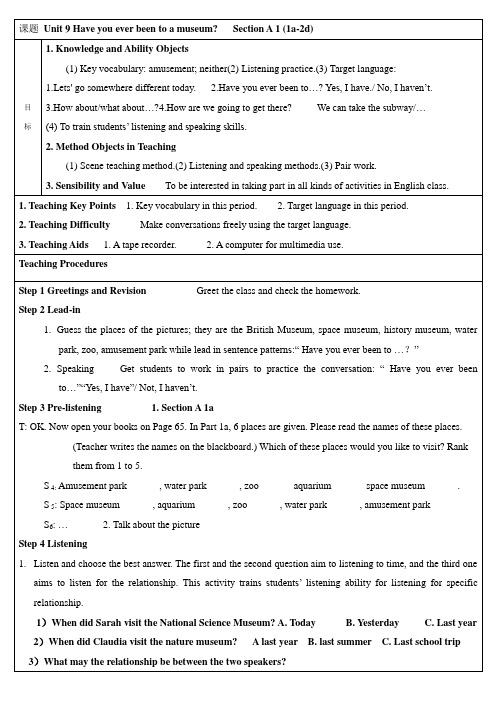
A. FriendsB. Teacher and studentC. Mother and kid. Answer: CCA2.Listen again. Listen and check the boxes. Have these students ever been to these places?Science museum History museum Art museum Nature museum Space museumClaudiaSarah √Step 5 SpeakingAsk and answer in pairs: A: let’s go somewhere different today.B: OK. Where do you want to go? A: Have you ever been to the space museum?B: No, I haven’t. How about you?A: …Step 6 Listening 2a 2b1.Listen and circle the places that you hear.2. Listen again and circle T for true or F for false.Conversation 11. Tina went to the space museum last year. T/F2. John has never been to the space museum. T/F3. They are going to take the subway. T/FConversation 21. Linda has been to the amusement park. T/F2. Linda went to the amusement park yesterday. T/F3. Linda is going to the amusement park again by bike. T/FConversation 31. Frank had a great time at the water park. T/F2. Frank’s friend has never been to the water park. T/F3. Frank and his friend are going skating. T/F Answer: TFT TFT FTT2.Speaking Look at the map in 2a and make conversations about the places.A: Have you ever been to the space museum? B: Yes, I have. How about you?A: No, I haven’t.B: Oh, it’s fantastic. Let’s go tomorrow.A: OK. How are we going to get there? B: We can take the subway.3.Speaking Role-play the conversation in 2d. A: I went to the film museum last weekend. Haveyou ever been there?B: Yes, I have. I went there back in April. ……Step 7 Language points1. I learned about the inventions that led to color movies, too. 我还了解了一些发明,它们成就了彩色电影。
新人教版八年级英语下册教案 Unit 9 Have you ever been to a museum教案

Unit 9 Have you ever been to a museum ? Teaching goals :1. 掌握如何表达现在完成时。
2. 对比现在完成时,一般过去时和现在进行时表将来的用法。
3. 描述某人曾经去过哪些有趣的地方。
Important and difficult points :1. 现在完成时态。
2. so 和neither 的区别。
3. have been to sw 与have gone to sw 的区别。
Structures :Have you ever been to an aquarium ?Yes , I’ve been to an aquarium .No ,I haven’t .No ,I’ve never been to an aquarium .I’ve never been to a water park . Neither have I .Functions : Talk about past experiences .Period 1Teaching of new lesson :Step 1 Assign the taskNew languageHave you ever been to Europe ?Yes ,I have . / No , I’ve never been to Europe .In this unit ,students learn to talk about past experiences in the other way .Step 2 Warm up Section A (1a-1c)SB Page 68 , 1a .1. Read each of the words and phras es at the top of the page to the class .2. Read the instructions .3. Do a quick check to see where Ss would like most to visit .SB Page 68 , 1b .1. Read the instructions .2. Point out the sample answer .3. Play the recording .Ask Ss to check off their answers .SB Page 68 , 1c .1. Read the instructions for the activity .2. Point to the example in the sample dialogue .Ask two students to read the dialogue to the class .3. Then have Ss work in pairs .4. Check the answers by calling on several different pairs of students to say their conversations to theclass .Step 3 Pre-taskSB Page 69 , 2a .1. Read the instructions .2. Point to the map ,play the recording and ask Ss to circle places on the map .3. Correct the answers .SB Page 69 , 2b .1. Read the instructions .Point out the sample answer .2. Po int out the statements about the three conversations .3. Play the recording again .Ask Ss to circle the word true or false after each statement .4. Correct the answers .SB Page 69 , 2c .1. Point to the map and tell Ss they can talk about any of the places on the map .2. Ask Ss to work in pairs .3. Ask several pairs of students to say their conversations to the class .Step 4 Grammar FocusReview the grammar box .Ask students to say the statements and responses .Exercise designing for Period 1 :词组翻译1. 太空博物馆2. 娱乐公园3. 水上公园4. 乘地铁在5. 去年6. 明年Period 2Teaching of new lessonsStep 1 Pre-taskSB Page 70 , 3a .1. Read the instructions .2. Then read the story to the class .After you finish ,ask if Ss have any questions about words and phrases in the article .3. Ask Ss to read the story again .Circle all the interesting things .4. Discuss the students’ answers .SB Page 70 , 3b .1. Read the instructions .2. Ask a pair of students to read the example in sample dialogue to the class .3. Then Ss work in pairs .4. Ask one or two pairs to say their conversationsto the class .Step 2 While-task1. Read the instructions .2. Ask two students to read the dialogue .3. Ask another pair of st udents to talk about something else they have .They should use the phrase : Have you ever … ?4. Ask Ss to complete the work in pairs .5. Ask a few students to share their list .You can ask for details and explanations of their answers .Exercise designing for Period 2 :词组翻译1. 从没去过迪斯尼乐园2. 玩得愉快3. 结束4. 主题公园5. 当然6. 一直7. 许多著名的人物8. 听说9. 行驶不同的路线 10. 在同一个地方Period 3Teaching of new lessonStep 1 Assign taskSB Page 71 , 1a .1. Read the instructions.2. Read each sentence to the class .3. Read the instruction again and say , Put 1afterthe most important reason that you learn English ,put 2 after the second most important reason and continue the same way .4. Do a quick check to see which reasons Ss think are most important .SB Page 71 , 1b .1. Point to the example in the sample dialogue .Ask two students to read it to the class .2. Ss work in groups .3. Ask several groups to say their conversations .SB Page 71 , 2a .1. Read the instructions and point out the sample answer .2. Play the recor ding .Ask Ss to circle their answers .3. Check the answers .SB page 71 , 2b .1. Read the instru ctions and point out the questionnaire .Ask a student to read the headings at the left .2. Play the recording .Ask Ss to fill in the answers .3. Check the answers. Ask Ss to write the answers on the board .SB Page 71 , 2c .1. Point to the example in the sample dialogue .Ask two students to read it to the class .2. Ask Ss to work in small groups .3. Ask several pairs to say their conversations to the class .Step 2 While-taskSB Page 72 , 3a .1. Ask different students to read each of the paragraphs to the class .Answer any questions students may have .2. Then say, Now read the paragraphs again and answer the questions .Correct the answers .SB Page 72 , 3b .1. Ask Ss to review the information in activity 3a .2. Ss write articles about themselves .As they work , move around the room offering language support as needed .SB Page 72 , Part 4 .1. Read the instructions to the class .2. Point out the example in the speech bubbles and have two students read it to the class .3. Discuss the answers with the class .Period 4Teaching of new lessonStep 1 Self CheckSB Page 73 , Part 1 .1. Ask Ss to fill in the blanks on their own .2. Check the answers .3. Ask Ss to make their own sentences with the words .4. Write a number of students’ answers for each word on the boardSB Page 73 , Part 2 .1. Read the instructions with the students .2. Ask Ss to complete the task by interviewing other students .3. Ask Ss to share their results with the class .SB Page 73 , Part 3 .1. Read the instructions and sample answer with the students .2. Ask Ss to complete the task .3. Ask Ss to share their short report with the class .Make sure Ss include details .Step 2 While-readingHave you ever been to Singapore ?SB Page 74 , Section 1 .1. Ask Ss if they have ever thought about traveling to a favorite foreign destination .Elicit ideas as a class .2. Ask the groups to choose one of the capital cities in the box and write four things the group knows about it .3. Discuss answer as a class .SB Page 74 , Section 2 .Ask Ss to read slowly and thoughtfully .They should be aware of the words they are reading as they read .SB Page 75 , Section 3 .1. Ask Ss to scan the reading to find more words for the different categories .2. Ask the class for any unusual words that they have found .3. 3c. Tell Ss to first read the false informationgiven in the exercise .Then ask them to scan the readingto find the correct details to write a true sentence .4. Ss complete the task .5. Check the answers .Exercise designing for Period 4 :单项选择( )1. He to Canada ,so you can not see him recently .A. wentB. has beenC. has goneD. have been gone( )2. ¬¬— have you been there since you became a teacher—Twice .A. How oftenB. How soonC. How longD. Hoe many times( )3. London has ever hosted the modern Olympics Paris .A. So doesB. So hasC. Nor doesD. Neither has( )4. —I haven’t been to the space museum .— .A. So do IB. Me tooC. Me neitherD. So have I( )5. There ar e many stores you can buy souvenirs from my hometown .A . which B. where C. when D. there。
人教版英语八下Unit 9《Have you ever been to a museum》教案

人教版英语八下Unit 9《Have you ever been to a museum》教案___: "Science Research Promotes High-Quality Standards"In this lesson。
we will focus on Unit 9: "Have you ever been to an amusement park?" as our topic。
Through this unit。
we aim to teach students how to use nal sentences to describe their past experiences。
learn the usage of the present perfect tense。
and differentiate een the present perfect tense and the simple past ___.This is the first lesson of this unit。
which includes n A: 1a。
1b。
1c。
2a。
2b。
and 2c。
n A 1a presents several interesting places。
___ their interest in learning。
1b is a ___ introduces the target language of this unit。
which is the present perfect ___ are required to listen to the ___ and Sarah have been to。
1c is an oral practice where students will pair up and use the target language to have ___2a and 2b are two ___ and be required to circle the place names they hear and judge the correctness of ___ based on what they hear。
人教版八下第九单元Have you ever been to a museum教案
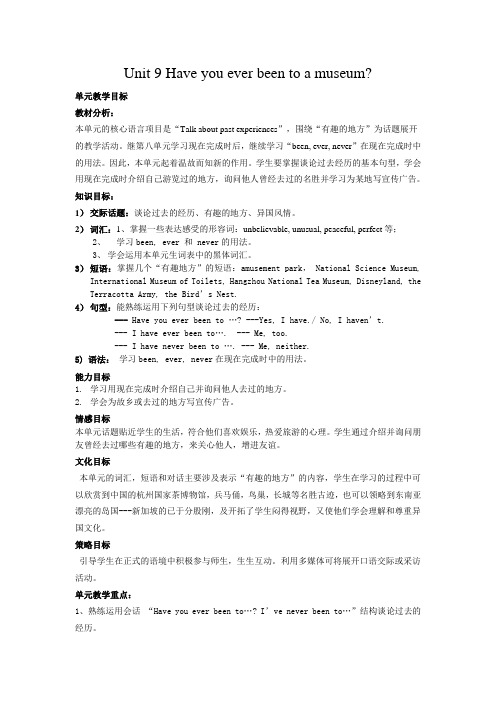
Unit 9 Have you ever been to a museum?单元教学目标教材分析:本单元的核心语言项目是“Talk about past experiences”,围绕“有趣的地方”为话题展开的教学活动。
继第八单元学习现在完成时后,继续学习“been, ever, never”在现在完成时中的用法。
因此,本单元起着温故而知新的作用。
学生要掌握谈论过去经历的基本句型,学会用现在完成时介绍自己游览过的地方,询问他人曾经去过的名胜并学习为某地写宣传广告。
知识目标:1)交际话题:谈论过去的经历、有趣的地方、异国风情。
2)词汇:1、掌握一些表达感受的形容词:unbelievable, unusual, peaceful, perfect等;2、学习been, ever 和 never的用法。
3、学会运用本单元生词表中的黑体词汇。
3)短语:掌握几个“有趣地方”的短语:amusement park, National Science Museum, International Museum of Toilets, Hangzhou National Tea Museum, Disneyland, the Terracotta Army, the Bird’s Nest.4)句型:能熟练运用下列句型谈论过去的经历:--- Have you ever been to …? ---Yes, I have./ No, I haven’t.--- I have ever been to…. --- Me, too.--- I have never been to …. --- Me, neither.5) 语法:学习been, ever, never在现在完成时中的用法。
能力目标1.学习用现在完成时介绍自己并询问他人去过的地方。
2.学会为故乡或去过的地方写宣传广告。
情感目标本单元话题贴近学生的生活,符合他们喜欢娱乐,热爱旅游的心理。
人教版英语八下Unit 9《Have you ever been to a museum》教案
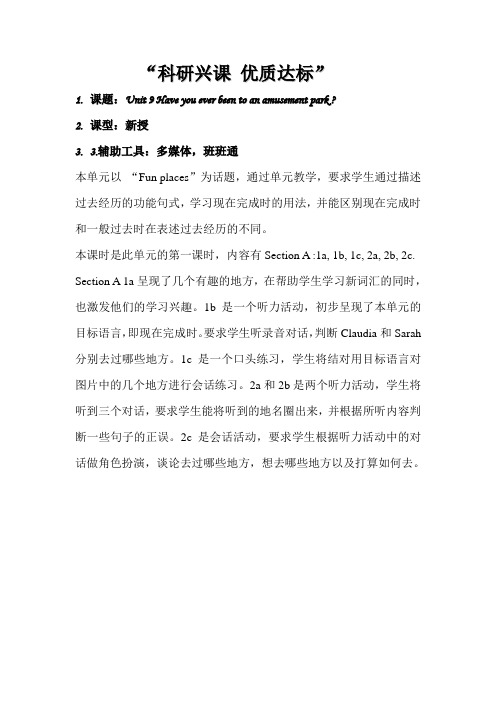
“科研兴课优质达标”1.课题:U n i t9H a v e y o u e v e r b e e n t o a n a m u s e m e n t p a r k?2.课型:新授3.3.辅助工具:多媒体,班班通本单元以“Fun places”为话题,通过单元教学,要求学生通过描述过去经历的功能句式,学习现在完成时的用法,并能区别现在完成时和一般过去时在表述过去经历的不同。
本课时是此单元的第一课时,内容有Section A :1a, 1b, 1c, 2a, 2b, 2c. Section A 1a呈现了几个有趣的地方,在帮助学生学习新词汇的同时,也激发他们的学习兴趣。
1b是一个听力活动,初步呈现了本单元的目标语言,即现在完成时。
要求学生听录音对话,判断Claudia和Sarah 分别去过哪些地方。
1c 是一个口头练习,学生将结对用目标语言对图片中的几个地方进行会话练习。
2a和2b是两个听力活动,学生将听到三个对话,要求学生能将听到的地名圈出来,并根据所听内容判断一些句子的正误。
2c是会话活动,要求学生根据听力活动中的对话做角色扮演,谈论去过哪些地方,想去哪些地方以及打算如何去。
第五课时ExercisesI. 根据单词首字母提示和句意完成下面的句子(10分)1. Holland is a E_______ country.2. He likes singing, e________ singing pop songs.3. Our new English teacher can play many m_________ instruments.4. Maybe when I g_________ I’ll b e a flight a ________.5. She has never been to an a____________ park. N __________ have I.6. There is an old f___________ car in the museum.7. I d_________ that secret.II. 连词成句:(20分)1. ever, you, to, been, have, museum, the_______________________________2. to, we, Water World, the, went, last year_______________________________3. I, see, language, movies, English, to went_______________________________4. next, is, to, the, going, zoo, week, he_______________________________5. the, for, years, job, twenty, she had, has_______________________________III. 单项选择:(20分)1. Mary has gone to the teacher’s office. ____________ has Joan.A. AndB. NeitherC. SoD. But2. He’d like ___________ to the supermarket.A. goingB. goesC. goD. to go3. My little brother has never been to __________ amusement park.A. aB. anC. /D. the4. Many of buses and taxis ___________ busy.A. beB. areC. isD. am5. Animal globes are ____________ very popular gifts.A. a kind ofB. kind ofC. the kind ofD. kinds of6. There are many _______ for visitors to the beach.A. ride boatB. boat rideC. boat ridesD. the boat rides7. Li Hua’s house is very far. She ________ the subway to school every day.A. takesB. takeC. will takeD. by8. _______ have you been studying English?A. WhenB. HowC. How longD. How many9. Please come here. I need __________ you several questions.A. askB. to askC. askingD. for asking10. I’m feeling better, so I’ve started ________.A. taking lessonsB. to take lessonC. taking lessonD. take lessonIV. 根据句意完成句子(20分)1. 你去过说英语的国家吗?没有去过。
人教版八年级下册《Unit 9 Have you ever been to a museum 》教案
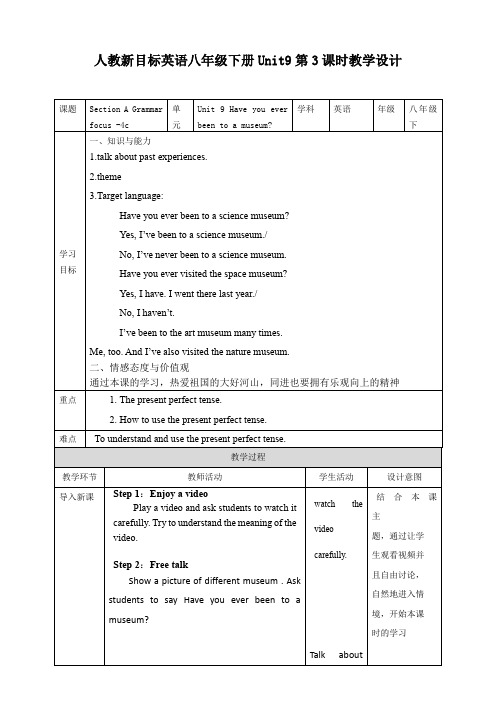
4a. Put the correct forms of the verbs in the blanks.
4b.Fill in the blanks with the correct forms of the verbs in brackets.
4c.Answer the survey questions and then ask your partner.
2.. Show the words one by one
quickly and ask students to speak out the
Chinese meaning of the words as soon as
quickly.
Step2:Grammar focus
Make a dialogue according to the text.
Yes, I have. I went there last year./
No, I haven’t.
I’ve been to the art museum many times.
Me, too. And I’ve also visited the nature museum.
二、情感态度与价值观
通过本课的学习,热爱祖国的大好河山,同进也要拥有乐观向上的精神
Play a video and ask students to watch it carefully. Try to understand the meaning of the video.
Step 2:Free talk
Show a picture ofdifferent museum. Ask students to sayHave you ever been to a museum?
人教版英语八年级下册Unit9Haveyoueverbeentoamuseum单元整体教学设计

(一)导入新课
1.教师出示博物馆的图片,引导学生谈论对博物馆的了解和参观经历,激发学生的学习兴趣。
-老师:Boys and girls, do you like visiting museums? Have you ever been to a museum? Can you share your experiences with us?
人教版英语八年级下册Unit9Haveyoueverbeentoamuseum单元整体教学设计
一、教学目标
(一)知识与技能
在本章节的学习中,学生将掌握以下知识与技能:
1.了解并运用与博物馆相关的英语词汇,如:artifact, exhibit, fossil, mummy, ancient, treasure等。
3.通过问答和讨论,教师引导学生关注博物馆的展品和特点,为新课的学习做好铺垫。
(二)讲授新知
1.教师呈现本节课的目标词汇,如:artifact, exhibit, fossil, mummy, ancient, treasure等,并结合图片进行讲解和示例。
-老师:In this unit, we will learn some words about museums. Look at this picture, what is it?
2.通过听力练习,提高听力理解能力,学会捕捉关键信息。
3.通过阅读文章,提升阅读理解能力,并掌握文章结构及写作技巧。
4.通过课堂讨论和课后实践,运用现在完成时态进行实际语境的交流。
5.通过完成课后作业和实践活动,巩固所学知识,形成长期记忆。
值观:
1.教师设计听力练习,让学生听一段关于博物馆的对话,并回答相关问题。
人教版八年级英语下册Unit9Haveyoueverbeentoamuseum教学设计
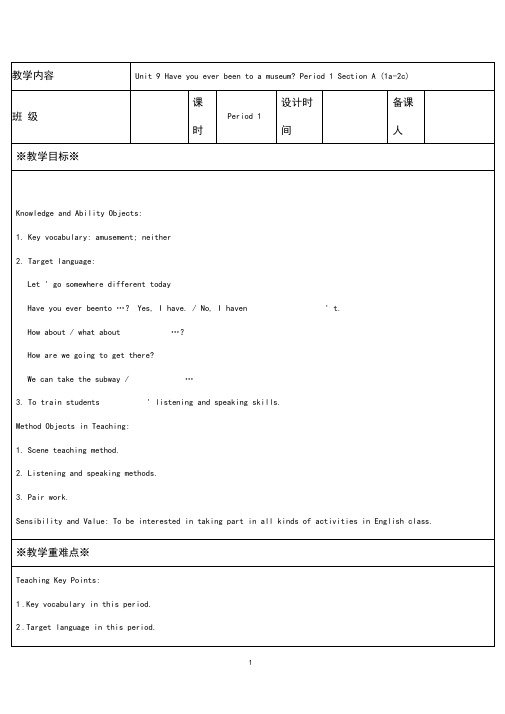
Teaching Difficulty: Make conversations freely using the target language.※教学准备※Teaching Aids:1. A tape recorder.2.A computer for multimedia use.※教学过程设计※Step 1 Greetings and RevisionGreet the class and check the homework.Step 2 Lead-in1.Guess the places of the pictures: they are art museum, space museum, history museum, water park, zoo, amusementpark while lead in sentence patterns: " Have you everbe 2.Get students to work in pairs to practice the conversation.A:Have you ever been to …B:Yes, I have / Not, I haven ' t.Step 3 Pre-listening1.(1a) Read the names of these places. Which of these places would you like to visit? Rank themfrom 1 to 5.2.Talk about the picture.Step 4 Listening1.(1b) Listen and check the boxes. Have these students ever been to these places?2.Check the answers.Step 5 Practice1.(1c) In pairs, ask and answer questions about the places in 1b.2.Ask some pairs to show their conversations.Step 6 Listening (2a, 2b)1.Look at the map of the town. Listen and circle the places that you hear.2.Listen again and circle T for true or F for false.3.Check the answers.Step 7 Practice (2 c)1.Look at the map in 2a and make conversations about the places.2.Ask some pairs to show their conversations to the class.Step 8 HomeworkPractice the dialogue and remember the language points.3.Preview the next lesson.※板书设计※Unit 9 Have you ever been to a museum?Period 1 Section A (1a-2c)space museum Have you ever been to an amusement park?amusement park Yes, I have. / No, I haven ' t.aquariumzoowater park※教学反思※教学内Unit 9 Have you ever been to a museum? Period 2 Section A (2d-3c) 容※教学目标※Knowledge and Ability Objects:1.Key vocabulary: unbelievable, progress, rapid, unusual, toilet, encourage, social, peaceful,performance,perfect, itself, collect2.Target language:1)I wonder how much more computer will be able to do in the future.2)Watching them prepare the tea with the beautiful tea sets is just as enjoyabledrinking the tea itself.3. To train students reading ability.4. To get students know some knowledge about many kinds of museums.Method Objects in Teaching:1.Skimming for details.2.Reading for comprehension.municative approach.Sensibility and Value: To raise students interest of learning English.※教学重难点※Teaching Key Points:1. Key vocabulary2. Target language:Teaching Difficulties1.How to improve reading skill.2.To understand the passage and the culture.※教学准备※Teaching Aids: 1. A tape recorder. 2. A computer for multimedia use.※教学过程设计※Step 1 Greetings and RevisionA:Have you ever been to …?B:Yes, I have. / No, I haven ' t.Step 2 Practice1.Role-play the conversation in 2d.A:I went to the film museum last weekend. Have you ever been there?B:Yes, I have. I went there back in April.A:…Step 3 Language points1.I learned about the inventions that led to color movies, too.此处learn是了解;获知;得知”的意思,由介词about或of引入所获知的具体内容。
八年级英语下册Unit9+Have+you+ever+been+to+a+museum全单元教案
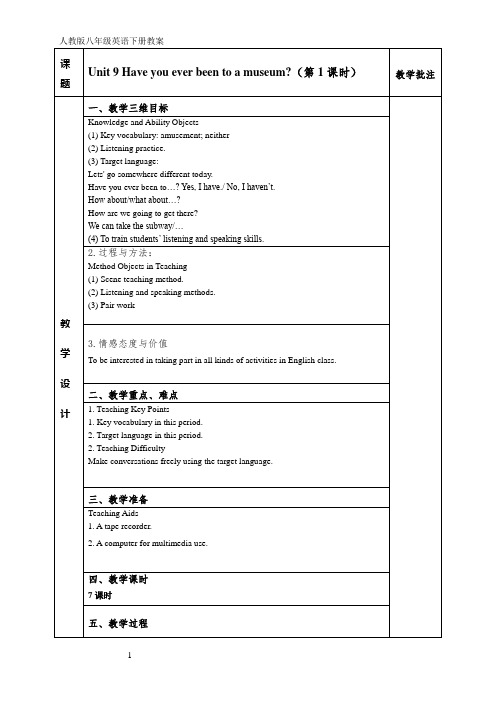
教学设计Listen again. Listen and check the boxes. Have these students ever been to these places?SciencemuseumHistorymuseumArt museum NaturemuseumSpace museum ClaudiaSarah √Step 5 SpeakingAsk and answer in pairs:A: let’s go somewhere different today.B: OK. Where do you want to go?A: Have you ever been to the space museum?B: No, I haven’t. How about you?A: …Step 6 Listening 2a 2bListen and circle the places that you hear.Listen again and circle T for true or F for false.Conversation 11. Tina went to the space museum last year. T/F2. John has never been to the space museum. T/F3. They are going to take the subway. T/FConversation 21. Linda has been to the amusement park. T/F2. Linda went to the amusement park yesterday. T/F3. Linda is going to the amusement park again by bike. T/FConversation 31. Frank had a great time at the water park. T/F2. Frank’s friend has never been to the water park. T/F3. Frank and his friend are going skating. T/FAnswer: TFT TFT FTTSpeakingLook at the map in 2a and make conversations about the places.A: Have you ever been to the space museum?B: Yes, I have. How about you?A: No, I haven’t.B: Oh, it’s fantastic. Let’s go tomorrow.A: OK. How are we going to get there?B: We can take the subway.SpeakingRole-play the conversation in 2d.Step 1 RevisionWhat do you know about Singapore?position: Where is Singapore?position: in Southeast AsiaPopulationMore than three quarters of the population are Chinese.LanguageChinese and English.FoodA lot of food from China, such as rice, noodles and dumplings.Indian food, western food and Japanese food.ZooSingapore has a special zoo called the “Night Safari”. A lot of animal only wake up at night, so this is the best time to watch them.WeatherThe temperature is almost the same all year round.Step 2 Writing3b Write an article to advertise your hometown or a place you have been to.句型:Have you ever tried/seen/been…?If you…, you will/can…You should…One great thing about …is…Step 3 Self check1. Think about the things below and write an answer for each one.1) One thing that you have collected before:_________________________________2) One invention that you have found to be very useful:_________________________________3) One unbelievable or unusual thing that you’ve seen or hea rd recently:_________________________________4) One way that you’ve used to encourage a friend in the past:_________________________________5) One peaceful and quiet place that you’ve been to recently:________________________________( )35.Which one can be the best title?A. Different animals in TanzaniaB. The ways of traveling in TanzaniaC. Why do we take a bus to travel?D. The beautiful country-TanzaniaBWhen you are in England,you must be very careful in the street because the traffic drives on the left. Before you cross a street,you must look to the right first and then the left. If the traffic lights are red,the traffic must stop. The people on foot can cross the road carefully. If the traffic lights are green,the traffic can go. The people on foot must not cross. In the morning and in the evening when people go to or come from work,the streets are very busy.When you go by bus in England,you have to be careful,too. Always remember the traffic moves on the left.So you must be careful. Have a look first or you will go the wrong way. In many English cities,there are big buses with two floors. You can sit on the second floor. From there you can see the city well. It is very interesting. ( )36.When you are in England, you must be more careful in the street because________.A. there are many cars and buses on the roadB. there are no traffic lightsC. the buses and cars move on the leftD. people on foot may cross the road( )37.In England,before you cross a street, you must look to first and then________.A. the right;the leftB.the left;the rightC. the front;the backD. the back;the front( )38. If the traffic lights are green, can go, mustn’t cross.A. the people on foot;the trafficB. the traffic;the people on bikeC. buses;carsD. the traffic;the pe ople on foot( )39. In England, you must always remember that the traffic _______.A. is busyB. moves on the leftC. moves on the rightD. with two floors ( )40. In many cities in England, there are big buses ________.A. with a lot of people in themB. with lots of seats in themC. with two floorsD. with interesting colors五.单词拼写(共10小题;每小题1分,满分10分)http://w ww.xkb 1. comA)根据首字母及汉语提示,完成下列单词的拼写,使句意明确,语言通顺。
人教版八年级英语下册Unit 9 Have you ever been to a museum 单元教案

Unit 9 Have you ever been to a museum?Section A 1 (1a-2d)教学目标1. Knowledge and Ability Objects(1) Key vocabulary: amusement; neither(2) Listening practice.(3) Target language:1.Lets' go somewhere different today.2.Have you ever been to…? Yes, I have./ No, I haven’t.3.How about/what about…?4.How are we going to get there?5.We can take the subway/…(4) To train students’ listening and speaking skills.2. Method Objects in Teaching(1) Scene teaching method.(2) Listening and speaking methods.(3) Pair work.3. Sensibility and ValueTo be interested in taking part in all kinds of activities in English class.教材分析1. Teaching Key Points1. Key vocabulary in this period.2. Target language in this period.2. Teaching DifficultyMake conversations freely using the target language.3. Teaching Aids1. A tape recorder.2. A computer for multimedia use.教学过程Teaching ProceduresStep 1 Greetings and RevisionGreet the class and check the homework.Step 2 Lead-in1.Guess the places of the pictures; they are the British Museum, space museum, historymuseum, water park, zoo, amusement park while lead in sentence p atterns:“ Have youever been to …?”2.SpeakingGet students to work in pairs to practice the conversation: “ Have you ever been to…”“Yes, I have”/ Not, I haven’t.Step 3 Pre-listening1. Section A 1aT: OK. Now open your books on Page 65. In Part 1a, 6 places are given. Please read the names of these places. (Teacher writes the names on the blackboard.) Which of theseplaces would you like to visit? Rank them from 1 to 5.S4:Amusement park ______, water park ______, zoo ______ aquarium ______ space museum ______.S 5: Space museum ______, aquarium ______, zoo ______, water park ______, amusement park ______S6: …2. Talk about the pictureStep 4 Listening1.Listen and choose the best answer. The first and the second question aim to listening to time,and the third one a ims to listen for the relationship. This activity trains students’ listening ability for listening for specific relationship.1)When did Sarah visit the National Science Museum?A. TodayB. Y esterdayC. Last year2)When did Claudia visit the nature museum?st yearB. last summerC. Last school trip3)What may the relationship be between the two speakers?A. FriendsB. Teacher and studentC. Mother and kid.Answer: CCA2.Listen again. Listen and check the boxes. Have these students ever been to these places?Science museum HistorymuseumArt museum Nature museum Space museumClaudiaSarah √Step 5 SpeakingAsk and answer in pairs:A: let’s go somewhere different today.B: OK. Where do you want to go?A: Have you ever been to the space museum?B: No, I haven’t. How about you?A: …Step 6 Listening 2a 2b1.Listen and circle the places that you hear.2.Listen again and circle T for true or F for false.Conversation 11. Tina went to the space museum last year. T/F2. John has never been to the space museum. T/F3. They are going to take the subway. T/FConversation 21. Linda has been to the amusement park. T/F2. Linda went to the amusement park yesterday. T/F3. Linda is going to the amusement park again by bike. T/FConversation 31. Frank had a great time at the water park. T/F2. Frank’s friend has never been to the water park. T/F3. Frank and his friend are going skating. T/FAnswer: TFT TFT FTT3.SpeakingLook at the map in 2a and make conversations about the places.A: Have you ever been to the space museum?B: Yes, I have. How about you?A: No, I haven’t.B: Oh, it’s fantastic. Let’s go tomorrow.A: OK. How are we going to get there?B: We can take the subway.4.SpeakingRole-play the conversation in 2d.A: I wen t to the film museum last weekend. Have you ever been there? …B: Yes, I have. I went there back in April. ……Step 7 Language points1. I learned about the inventions that led to color movies, too. 我还了解了一些发明,它们成就了彩色电影。
人教新目标版八年级英语下册 Unit 9 Have you ever been to a museum Grammar Focus-4c教案
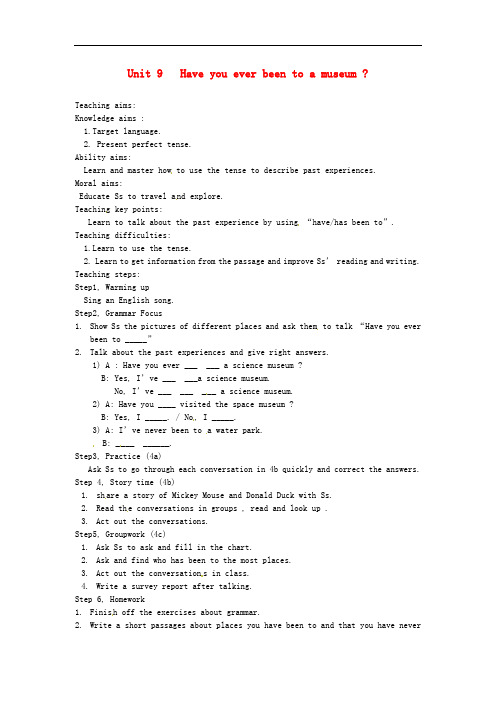
Unit 9 Have you ever been to a museum ?Teaching aims:Knowledge aims :1.Target language.2. Present perfect tense.Ability aims:Learn and master how to use the tense to describe past experiences.Moral aims:Educate Ss to travel a nd explore.Teaching key points:Learn to talk about the past experience by using“have/has been to”. Teaching difficulties:1.Learn to use the tense.2. Learn to get information from the passage and improve Ss’reading and writing. Teaching steps:Step1, Warming upSing an English song.Step2, Grammar Focus1.Show Ss the pictures of different places and ask them to talk “Have you everbeen to _____”2.Talk about the past experiences and give right answers.1) A : Have you ever ___ ___ a science museum ?B: Yes, I’ve ___ ___a science museum.No, I’ve ___ ___ ___ a science museum.2) A: Have you ____ visited the space museum ?B: Yes, I _____. / No, I _____.3) A: I’ve never been to a water park.B: ____ ______.Step3, Practice (4a)Ask Ss to go through each conversation in 4b quickly and correct the answers. Step 4, Story time (4b)1.sh are a story of Mickey Mouse and Donald Duck with Ss.2.Read th e conversations in groups , read and look up .3.Act out the conversations.Step5, Groupwork (4c)1.Ask Ss to ask and fill in the chart.2.Ask and find who has been to the most places.3.Act out the conversation s in class.4.Write a survey report after talking.Step 6, Homework1.Finis h off the exercises about grammar.2.Write a short passages about places you have been to and that you have neverbeen to .。
人教新目标八年级英语下册 Unit 9 Have you ever been to a museu
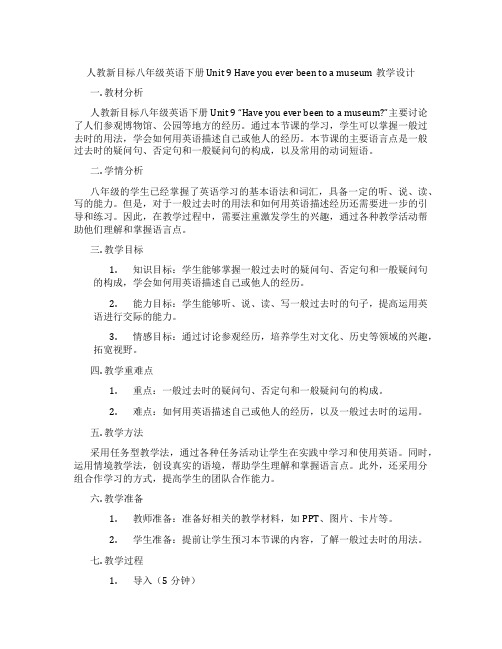
人教新目标八年级英语下册 Unit 9 Have you ever been to a museum教学设计一. 教材分析人教新目标八年级英语下册Unit 9 “Have you ever been to a museum?”主要讨论了人们参观博物馆、公园等地方的经历。
通过本节课的学习,学生可以掌握一般过去时的用法,学会如何用英语描述自己或他人的经历。
本节课的主要语言点是一般过去时的疑问句、否定句和一般疑问句的构成,以及常用的动词短语。
二. 学情分析八年级的学生已经掌握了英语学习的基本语法和词汇,具备一定的听、说、读、写的能力。
但是,对于一般过去时的用法和如何用英语描述经历还需要进一步的引导和练习。
因此,在教学过程中,需要注重激发学生的兴趣,通过各种教学活动帮助他们理解和掌握语言点。
三. 教学目标1.知识目标:学生能够掌握一般过去时的疑问句、否定句和一般疑问句的构成,学会如何用英语描述自己或他人的经历。
2.能力目标:学生能够听、说、读、写一般过去时的句子,提高运用英语进行交际的能力。
3.情感目标:通过讨论参观经历,培养学生对文化、历史等领域的兴趣,拓宽视野。
四. 教学重难点1.重点:一般过去时的疑问句、否定句和一般疑问句的构成。
2.难点:如何用英语描述自己或他人的经历,以及一般过去时的运用。
五. 教学方法采用任务型教学法,通过各种任务活动让学生在实践中学习和使用英语。
同时,运用情境教学法,创设真实的语境,帮助学生理解和掌握语言点。
此外,还采用分组合作学习的方式,提高学生的团队合作能力。
六. 教学准备1.教师准备:准备好相关的教学材料,如PPT、图片、卡片等。
2.学生准备:提前让学生预习本节课的内容,了解一般过去时的用法。
七. 教学过程1.导入(5分钟)通过展示一些博物馆、公园等地方的图片,引导学生谈论自己参观的经历,激发学生的兴趣。
2.呈现(10分钟)教师通过PPT展示一般过去时的疑问句、否定句和一般疑问句的构成,以及常用的动词短语。
八年级英语(人教版)下册Unit9Haveyoueverbeentoamuseum教学设计
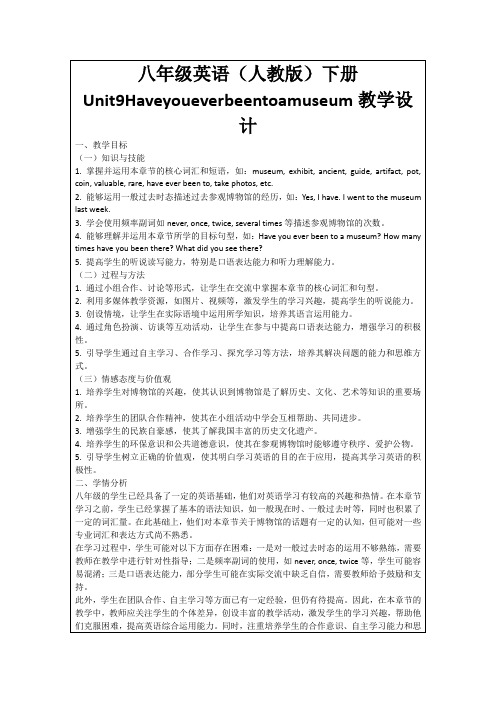
此外,学生在团队合作、自主学习等方面已有一定经验,但仍有待提高。因此,在本章节的教学中,教师应关注学生的个体差异,创设丰富的教学活动,激发学生的学习兴趣,帮助他们克服困难,提高英语综合运用能力。同时,注重培养学生的合作意识、自主学习能力和思维能力,为其今后的英语学习打下坚实基础。
5.引导学生通过自主学习、合作学习、探究学习等方法,培养其解决问题的能力和思维方式。
(三)情感态度与价值观
1.培养学生对博物馆的兴趣,使其认识到博物馆是了解历史、文化、艺术等知识的重要场所。
2.培养学生的团队合作精神,使其在小组活动中学会互相帮助、共同进步。
3.增强学生的民族自豪感,使其了解我国丰富的历史文化遗产。
4.培养学生的环保意识和公共道德意识,使其在参观博物馆时能够遵守秩序、爱护公物。
5.引导学生树立正确的价值观,使其明白学习英语的目的在于应用,提高其学习英语的积极性。
二、学情分析
八年级的学生已经具备了一定的英语基础,他们对英语学习有较高的兴趣和热情。在本章节学习之前,学生已经掌握了基本的语法知识,如一般现在时、一般过去时等,同时也积累了一定的词汇量。在此基础上,他们对本章节关于博物馆的话题有一定的认知,但可能对一些专业词汇和表达方式尚不熟悉。
2.讲解频率副词的用法,如never, once, twice, several times等,并通过例句展示,让学生在实际语境中理解。
3.引导学生通过小组合作,用一般过去时态描述过去参观博物馆的经历,加强学生对新知识的运用。
人教新目标版英语八下Unit 9《Have you ever been to a museum》教学
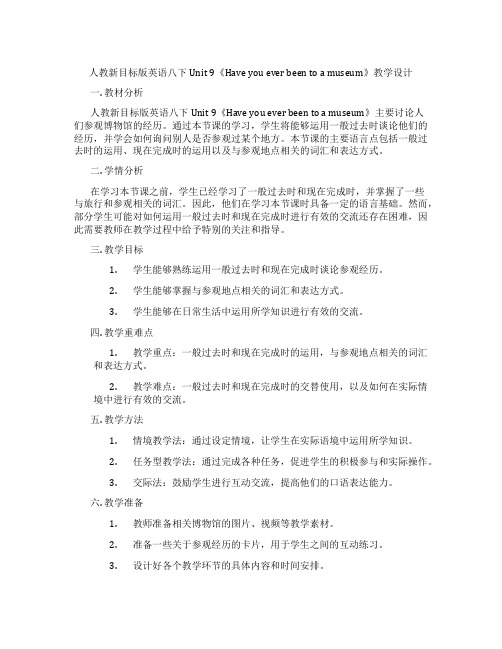
人教新目标版英语八下Unit 9《Have you ever been to a museum》教学设计一. 教材分析人教新目标版英语八下Unit 9《Have you ever been to a museum》主要讨论人们参观博物馆的经历。
通过本节课的学习,学生将能够运用一般过去时谈论他们的经历,并学会如何询问别人是否参观过某个地方。
本节课的主要语言点包括一般过去时的运用、现在完成时的运用以及与参观地点相关的词汇和表达方式。
二. 学情分析在学习本节课之前,学生已经学习了一般过去时和现在完成时,并掌握了一些与旅行和参观相关的词汇。
因此,他们在学习本节课时具备一定的语言基础。
然而,部分学生可能对如何运用一般过去时和现在完成时进行有效的交流还存在困难,因此需要教师在教学过程中给予特别的关注和指导。
三. 教学目标1.学生能够熟练运用一般过去时和现在完成时谈论参观经历。
2.学生能够掌握与参观地点相关的词汇和表达方式。
3.学生能够在日常生活中运用所学知识进行有效的交流。
四. 教学重难点1.教学重点:一般过去时和现在完成时的运用,与参观地点相关的词汇和表达方式。
2.教学难点:一般过去时和现在完成时的交替使用,以及如何在实际情境中进行有效的交流。
五. 教学方法1.情境教学法:通过设定情境,让学生在实际语境中运用所学知识。
2.任务型教学法:通过完成各种任务,促进学生的积极参与和实际操作。
3.交际法:鼓励学生进行互动交流,提高他们的口语表达能力。
六. 教学准备1.教师准备相关博物馆的图片、视频等教学素材。
2.准备一些关于参观经历的卡片,用于学生之间的互动练习。
3.设计好各个教学环节的具体内容和时间安排。
七. 教学过程1.导入(5分钟)教师通过展示一些博物馆的图片和视频,引导学生谈论他们所了解的博物馆。
然后,教师提问:“Have you ever been to a museum?”, 让学生用一般过去时回答。
2.呈现(10分钟)教师呈现本节课的主要内容,包括一般过去时的运用、现在完成时的运用以及与参观地点相关的词汇和表达方式。
人教版八年级英语下册Unit9Haveyoueverbeentoamuseum(15课时)教学设计
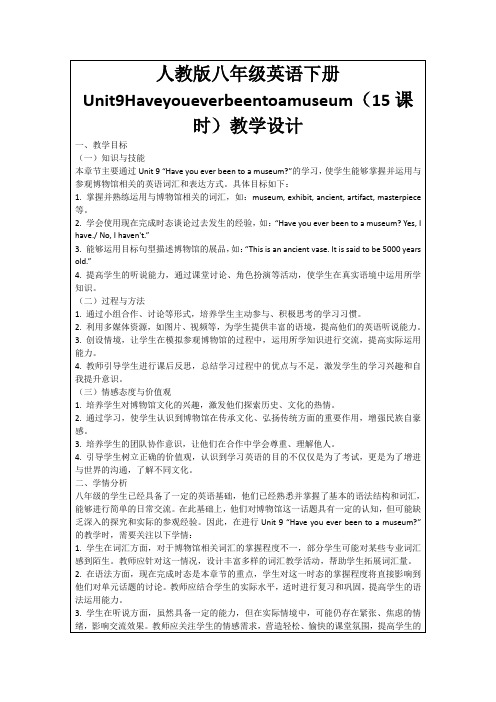
3.现实生活与课堂相结合:结合学生的实际生活,引导他们运用所学知识描述博物馆展品,提高实际运用能力。
-教学活动:组织角色扮演活动,让学生模拟在博物馆中为他人介绍展品,锻炼学生的听说能力。
4.语法点讲解与练习相结合:通过讲解、例句展示和练习,帮助学生掌握现在完成时态的用法,提高语法水平。
-教学活动:布置课后作业,要求学生用英语撰写一篇关于博物馆参观的短文,并对自己的作业进行自我评价。
四、教学内容与过程
(一)导入新课
1.教学活动:教师通过展示一组博物馆图片,引导学生谈论对博物馆的印象,激活学生的背景知识。
2.教学内容:学生分享自己对博物馆的了解,包括博物馆的类型、展品种类等。
3.教学方法:采用提问、讨论的方式,激发学生的兴趣,为新课学习做好铺垫。
3.教学方法:通过提问、师生互动等方式,检验学生对课堂内容的掌握,并及时给予反馈。
在整个教学内容与过程中,教师应关注学生的个体差异,适时给予指导和帮助。同时,注重情感教育,营造轻松、愉快的课堂氛围,使学生在愉悦的情感体验中学习英语。通过本节课的学习,学生能够掌握博物馆相关词汇,熟练运用现在完成时态,提高听说能力和实际运用能力,增强对博物馆文化的了解和兴趣。
2.通过学习,使学生认识到博物馆在传承文化、弘扬传统方面的重要作用,增强民族自豪感。
3.培养学生的团队协作意识,让他们在合作中学会尊重、理解他人。
4.引导学生树立正确的价值观,认识到学习英语的目的不仅仅是为了考试,更是为了增进与世界的沟通,了解不同文化。
二、学情分析
八年级的学生已经具备了一定的英语基础,他们已经熟悉并掌握了基本的语法结构和词汇,能够进行简单的日常交流。在此基础上,他们对博物馆这一话题具有一定的认知,但可能缺乏深入的探究和实际的参观经验。因此,在进行Unit 9 “Have you ever been to a museum?”的教学时,需要关注以下学情:
人教版英语八下Unit9Haveyoueverbeentoamuseum单元教案(5份)
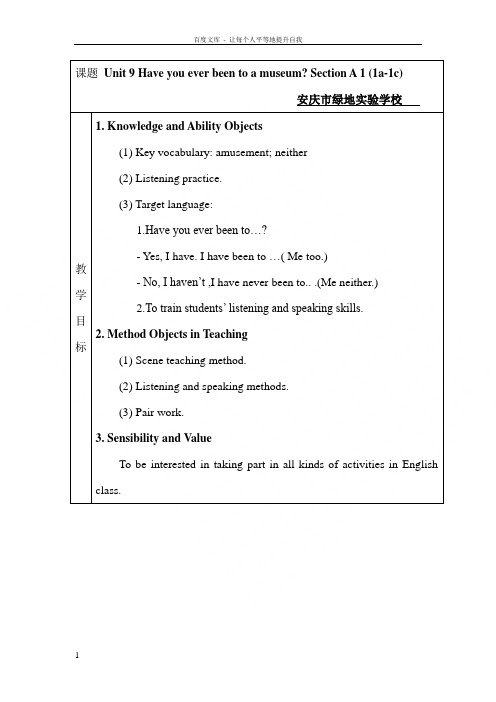
课题Unit 9 Have you ever been to a museum? Section A 1 (1a-1c)安庆市绿地实验学校教学目标1. Knowledge and Ability Objects(1) Key vocabulary: amusement; neither(2) Listening practice.(3) Target language:1.Have you ever been to…?- Yes, I have. I have been to …( Me too.)- No, I haven’t ,I have never been to.. .(Me neither.)2.To train students’ listening and speaking skills.2. Method Objects in Teaching(1) Scene teaching method.(2) Listening and speaking methods.(3) Pair work.3. Sensibility and ValueTo be interested in taking part in all kinds of activities in English class.教材分析1. Teaching Key Points1. Key vocabulary in this period.2. Target language in this period.2. Teaching DifficultyMake conversations freely using the target language.3. Teaching AidsA computer for multimedia use.时序Teaching ProceduresStep 1 GreetingsGreet the class and show a short movie.Step 2 Lead-inGuess “where did I go “,There are many fun places in Shanghai :, space museum, history museum, art museum water park, zoo, amusement park.Step3 GameEncourage students to join this game.Step4 Section A 1aT: OK. Now open your books on Page 65., 6 places are given.Please read the names of these places. (Teacher writes thenames on the blackboard.) Which of these places wouldyou like to visit? Rank them from 1 to 6.Step 5 Practice1.Show some pictures then practice the sentencesHave you ever been to…?- Yes, I have. I have been to …( Me too.)- No, I haven’t ,I have never been to.. .(Me neither.)2. Talk about the main pictureRead after the teacher, then read together.Step6 Listening1.Listen and choose the best answer.. This activity trains students’listening ability. 1)When did Sarah visit the National Science Museum?A. TodayB. YesterdayC. Last year2)When did Claudia visit the nature museum?st yearB. last summerC. Last school trip3)What may the relationship be between the two speakers?A. FriendsB. Teacher and studentC. Mother and kid.Answer: CCA2.Listen again. Listen and check the boxes. Have these students everbeen to these places?Science museum HistorymuseumArtmuseumNaturemuseumSpacemuseumClaudiaSarah √Step 7 Pair work (Activity 1c)1.Play a video from four students.2.Make the conversation with deskmate, then ask some pairs to present them.Step 8InterviewT:I need three interviewers to interview three of your best friends.Have you ever been to……?Step 9 Summary & Homework.To recite these new words and sentences.。
人教版八年级英语下册教案Unit9HaveyoueverbeentoamuseumGrammarFocus-4c

Unit 9 Have you ever been to a museum ?Teaching aims:Knowledge aims :1.Target language.2. Present perfect tense.Ability aims:Learn and master how to use the tense to describe past experiences.Moral aims:Educate Ss to travel a nd explore.Teaching key points:Learn to talk about the past experience by using“have/has been to”. Teaching difficulties:1.Learn to use the tense.2. Learn to get information from the passage and improve Ss’reading and writing. Teaching steps:Step1, Warming upSing an English song.Step2, Grammar Focus1.Show Ss the pictures of different places and ask them to talk “Have you everbeen to _____”2.Talk about the past experiences and give right answers.1) A : Have you ever ___ ___ a science museum ?B: Yes, I’ve ___ ___a science museum.No, I’ve ___ ___ ___ a science museum.2) A: Have you ____ visited the space museum ?B: Yes, I _____. / No, I _____.3) A: I’ve never been to a water park.B: ____ ______.Step3, Practice (4a)Ask Ss to go through each conversation in 4b quickly and correct the answers. Step 4, Story time (4b)1.sh are a story of Mickey Mouse and Donald Duck with Ss.2.Read th e conversations in groups , read and look up .3.Act out the conversations.Step5, Groupwork (4c)1.Ask Ss to ask and fill in the chart.2.Ask and find who has been to the most places.3.Act out the conversation s in class.4.Write a survey report after talking.Step 6, Homework1.Finis h off the exercises about grammar.2.Write a short passages about places you have been to and that you have neverbeen to .。
- 1、下载文档前请自行甄别文档内容的完整性,平台不提供额外的编辑、内容补充、找答案等附加服务。
- 2、"仅部分预览"的文档,不可在线预览部分如存在完整性等问题,可反馈申请退款(可完整预览的文档不适用该条件!)。
- 3、如文档侵犯您的权益,请联系客服反馈,我们会尽快为您处理(人工客服工作时间:9:00-18:30)。
“科研兴课优质达标”
1.课题:U n i t9H a v e y o u e v e r b e e n t o a n a m u s e m e n t p a r k?
2.课型:新授
3.3.辅助工具:多媒体,班班通
本单元以“Fun places”为话题,通过单元教学,要求学生通过描述过去经历的功能句式,学习现在完成时的用法,并能区别现在完成时和一般过去时在表述过去经历的不同。
本课时是此单元的第一课时,内容有Section A :1a, 1b, 1c, 2a, 2b, 2c. Section A 1a呈现了几个有趣的地方,在帮助学生学习新词汇的同时,也激发他们的学习兴趣。
1b是一个听力活动,初步呈现了本单元的目标语言,即现在完成时。
要求学生听录音对话,判断Claudia和Sarah 分别去过哪些地方。
1c 是一个口头练习,学生将结对用目标语言对图片中的几个地方进行会话练习。
2a和2b是两个听力活动,学生将听到三个对话,要求学生能将听到的地名圈出来,并根据所听内容判断一些句子的正误。
2c是会话活动,要求学生根据听力活动中的对话做角色扮演,谈论去过哪些地方,想去哪些地方以及打算如何去。
Exercises
I. 根据单词首字母提示和句意完成下面的句子(10分)
1. Holland is a E_______ country.
2. He likes singing, e________ singing pop songs.
3. Our new English teacher can play many m_________ instruments.
4. May be when I g_________ I’ll be a flight a ________.
5. She has never been to an a____________ park. N __________ have I.
6. There is an old f___________ car in the museum.
7. I d_________ that secret.
II. 连词成句:(20分)
1. ever, you, to, been, have, museum, the
_______________________________
2. to, we, Water World, the, went, last year
_______________________________
3. I, see, language, movies, English, to went
_______________________________
4. next, is, to, the, going, zoo, week, he
_______________________________
5. the, for, years, job, twenty, she had, has
_______________________________
III. 单项选择:(20分)
1. Mary has gone to the teacher’s office. ____________ has Joan.
A. And
B. Neither
C. So
D. But
2. He’d like ___________ to the supermarket.
A. going
B. goes
C. go
D. to go
3. My little brother has never been to __________ amusement park.
A. a
B. an
C. /
D. the
4. Many of buses and taxis ___________ busy.
A. be
B. are
C. is
D. am
5. Animal globes are ____________ very popular gifts.
A. a kind of
B. kind of
C. the kind of
D. kinds of
6. There are many _______ for visitors to the beach.
A. ride boat
B. boat ride
C. boat rides
D. the boat rides
7. Li Hua’s house is very far. She ________ the subway to school every day.
A. takes
B. take
C. will take
D. by
8. _______ have you been studying English?
A. When
B. How
C. How long
D. How many
9. Please come here. I need __________ you several questions.
A. ask
B. to ask
C. asking
D. for asking
10. I’m feeling better, so I’ve started ________.
A. taking lessons
B. to take lesson
C. taking lesson
D. take lesson
IV. 根据句意完成句子(20分)
1. 你去过说英语的国家吗?没有去过。
________ you ever ______ English-speaking countries?
No, I ________.
2. 这个孩子要了五十元钱去买了CD盘。
The child ________ 50 yuan _________ some CDs.
3. 他们已经决定学习英语了。
They ____________________ to study English.
4. 学好英语的最好方法是尽可能的多说。
____________ to study English well ____________ speak as often as possible.
5. 我妈妈在这家医院已经当医生十三年了。
My mom ________________ a doctor in this hospital ___________ 3 years.
6. 我发现足球赛确实很精彩。
I found the football match ___________________.
7. 我正在考虑飞往上海而不是乘火车。
I’m thinking about ___________ to Shanghai rather than ___________ there ______ train.
8. 我爷爷没有去过美国。
我爸爸也没有去过。
My grandfather _____________ to America. ________ my father.
9. 他们两个以前都不喜欢看电视。
________ of them _________ watching TV.
10. 我的听力技巧需要提高。
My _____________ skills need ___________.。
